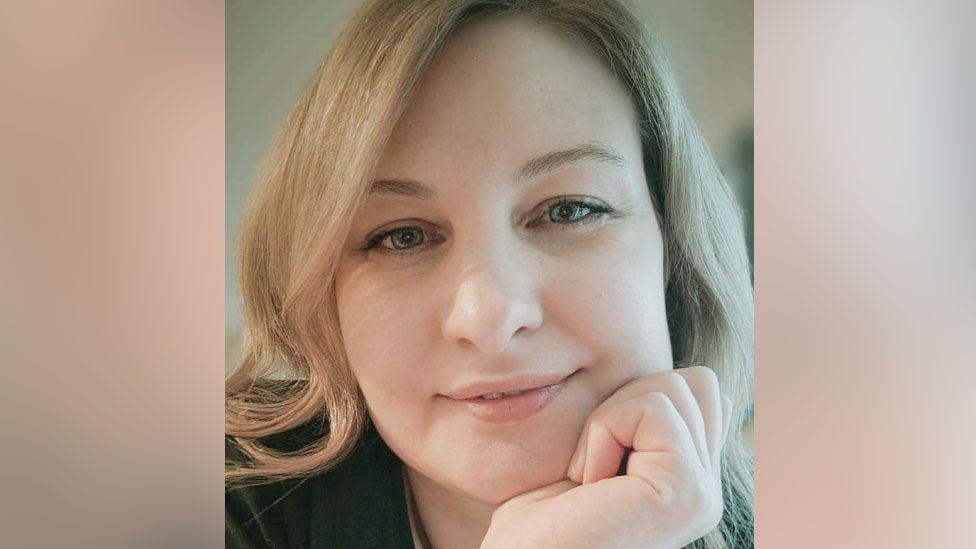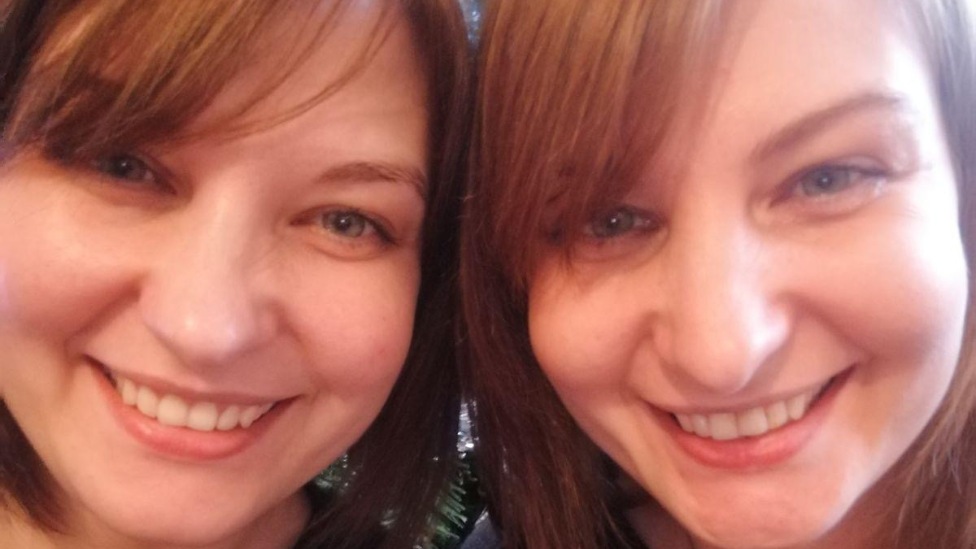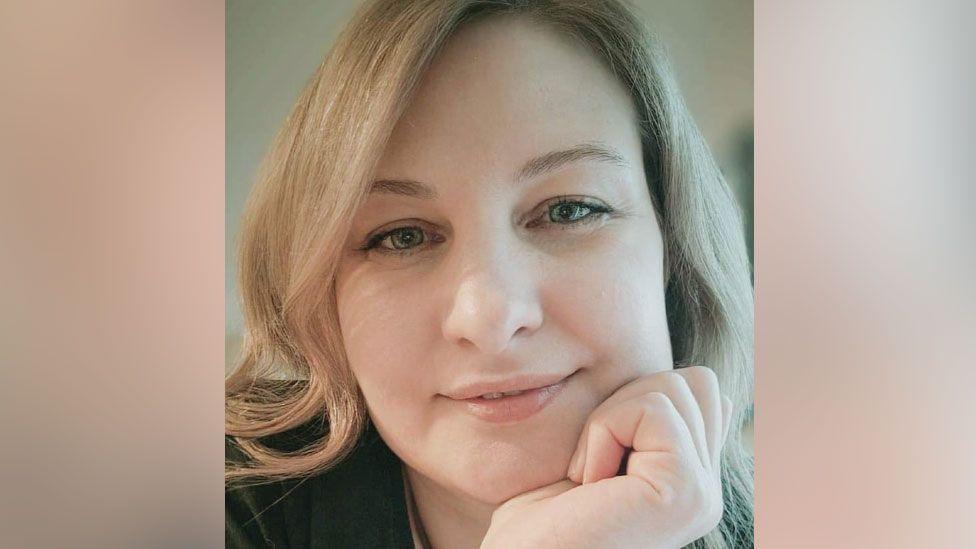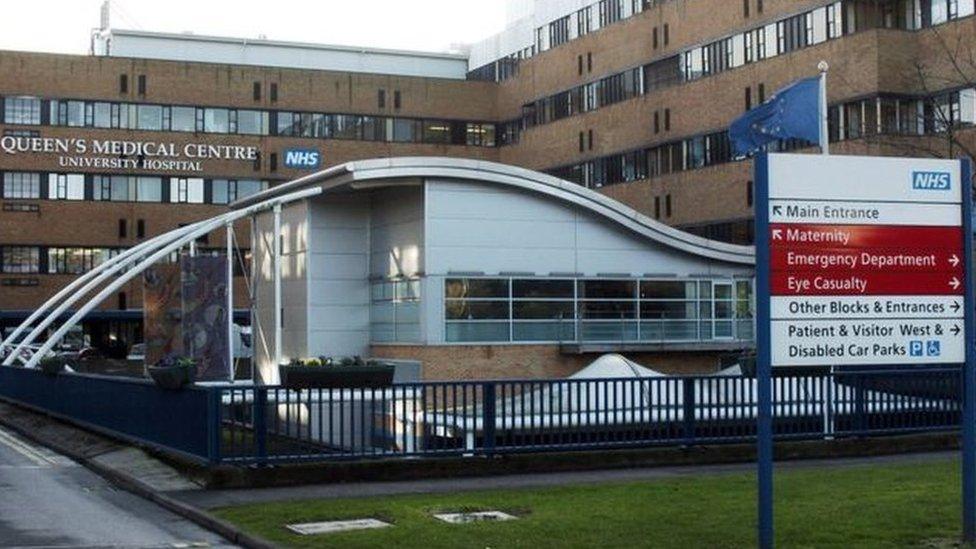'Missed chances' over death of mum found under coat in A&E

Inga Rublite, 39, was thought to have left the hospital but was found behind a door in the emergency department
- Published
A coroner has ruled "opportunities were missed" in the care of a woman who died after waiting for more than eight hours in a crowded A&E waiting room.
Inga Rublite, a 39-year-old mum of two, was found unconscious under her coat at the Queen's Medical Centre (QMC) in Nottingham on 20 January, and died days later from a brain aneurysm.
Following a two-day inquest, coroner Dr Elizabeth Didcock concluded Ms Rublite died of natural causes - but said there were two missed opportunities to diagnose her.
Nottingham University Hospitals (NUH) NHS Trust said it accepted there were missed opportunities in Ms Rublite's care, adding it was "truly sorry that [it] did not meet the standards we strive to deliver".
Ms Rublite had called 111 on 19 January, with a severe headache, neck pain and blurred vision.
The inquest at Nottingham Coroner's Court heard she had been advised to go to hospital, where she arrived at about 22:30 GMT.
After her last assessment by staff at the QMC at 02:00, Ms Rublite did not respond to her name being called three times between 04:30 and 06:50.
Staff registered her as having been discharged, but found her 10 minutes later "slumped" on to the floor with her coat over her head.

Inese Briede, Ms Rublite's twin sister, attended the conclusion in Nottingham before returning to Latvia
The coroner said Ms Rublite was appropriately triaged by a nurse on attendance to the emergency department.
However, a later discussion with a junior member of medical staff about her symptoms, followed by a failure to refer her for a CT scan, were considered a missed opportunity.
The coroner said this should have been handled by a senior member of staff.
Following a second assessment shortly after 02:00 on 20 January, during which Ms Rublite had reported severe pain, there was no escalation in her care, which the coroner considered a second missed opportunity.
Ms Didcock added she was "struck by a lack of repeated calling" if a person did not respond to being called in the emergency department, adding she would have expected further calls 10 to 15 minutes after each missed callout.
'Extreme pressure'
However, Ms Didcock said if Ms Rublite was admitted as she should have been, she still would have had a "second and rapid devastating bleed" on the brain.
Between 19 and 20 January, the emergency department at the QMC was overcrowded and understaffed, the inquest heard.
The emergency department - which has a capacity of 36 people - had 76 people waiting when Ms Rublite arrived, the coroner said.
Ms Didcock said a lot of issues revealed in this case were "out of [the trust's] reach".
Dr Manjeet Shehmar, medical director at the hospital trust, said: "We would like to offer our sincere condolences to the family of Inga for their loss. Although due to the nature of the bleed on the brain the outcome is unlikely to have been different, we accept there were missed opportunities in Inga's care and are truly sorry that we did not meet the standards we strive to deliver.
"We recognise there are times when our hospitals are under extreme pressure which can impact patient experience. Our teams continue to work hard to maintain safe services and improve flow across our sites. We apologise to patients who experience delays in their care, and continue to prioritise patients with the highest level of need.
"We have completed an investigation in order to assess and implement learning, and as a result have introduced changes in our emergency department to ensure we can deliver better care to patients and support our staff to do this in the future.
"We fully accept the coroner's findings, and are determined to take all action possible to improve our care."
Follow BBC Nottingham on Facebook, external, on X, external, or on Instagram, external. Send your story ideas to eastmidsnews@bbc.co.uk, external or via WhatsApp, external on 0808 100 2210.
Related topics
- Published24 July 2024

- Published9 February 2024
